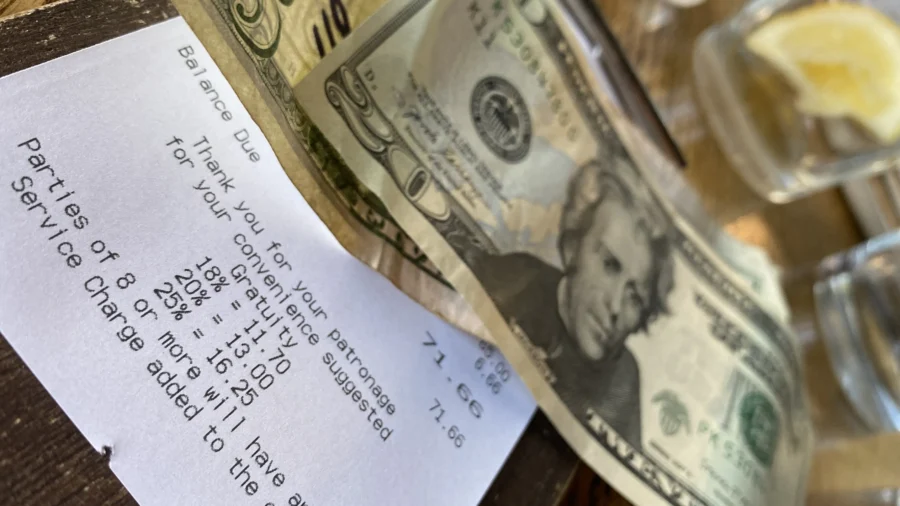In the 1960 Flintstones episode “The Drive-In,” Fred and Barney invest in a failed restaurant, only to be told by a supply vendor that one thing they need to succeed is three tons of parsley.
When asked why, the vendor replies, “You put some parsley on each order so the customer can throw it away. … It’s been going on for years.”
While parsley on food orders has almost gone the way of the dinosaur, one ongoing business custom that remains almost as open to question is restaurant tipping.
The practice, as Americans now know it, has been in place since Prohibition. Despite being viewed as a vital component of the U.S. restaurant industry, tipping has not only come under fire for being either too tight-fisted or too excessive, it may soon come to a crossroads where customers dictate harsher terms.
“The hospitality industry is very labor-intensive to generate the same kind of revenue as other small businesses,” Susan Cohen, president and CEO of the South Carolina Restaurant & Lodging Association, told The Epoch Times.
“Many of our full-service restaurants report increased costs of 35 percent for food, staffing, everything, since the pandemic. And it would not be possible to sustain the necessary staff without skyrocketing menu prices, if not for tipping.”
But like the restaurant parsley, should tipping be mandatory or left up to the customer to keep or discard?
Servers Cara Newman from Maryland and Hannah Moore from Michigan vote without reservation for a fixed industry guide—partly because tipping by choice is too uncertain for customers to guess at and too variable for servers to know what they will earn from one week to the next.
“Mandatory tips would eliminate the uncertainty held by both parties,” Moore said in a public online video supporting mandatory tipping.
Newman said that the earnings without tips are not even up to the minimum standards of other jobs.
“Maryland’s minimum cash wage is currently $3.63—leaving [servers] with a yearly total of $6,960,” she said in a separate online video. “Less than seven grand a year is very difficult to live off of, especially with everything a server has to learn and endure.”
She said that in addition to managing multiple orders and providing patrons with food in a timely manner, servers are required to do many things.
They must set up the restaurant, which means they are on-site at least 2-3 hours before opening, and memorize the menu, which often changes. Not only are they required to be on their feet for hours at a time, but they also need to learn the computer system and perfect their people skills to work well under “intense amounts of pressure.”
“People in the service industry should not have to work nearly a hundred hours a week just to barely reach the average living wage in the United States,” Moore said. “Making tips mandatory would be one step in finding a resolution to this problem.”
Regular restaurant patrons Louie Lewis and Harold Moore from Greenville, South Carolina, disagreed.
While Lewis admitted he has heard stories about servers being stiffed on large orders and sometimes having to endure the wrath of an irate customer, he said he has rarely witnessed such behavior.
“I usually have a good experience when I eat out and can count on one hand how many times I haven’t tipped a server in the past 40 years,” Lewis told The Epoch Times.
Moore said that tipping by choice actually makes him want to tip.
“But I would be less inclined to do so if I thought it was a requirement,” he told The Epoch Times.
The vast majority of restaurant patrons echo Moore’s point of view.
According to a 2023 survey of 11,945 Americans by Pew Research Center, a public policy research and survey institute in Washington, 72 percent said that while tipping is expected in more places today than in 2018, many are unsure if the practice is still a choice or whether it is now an obligation.
But John Sobota, a lecturer, recruiter, and program director of hospitality and technology innovation at the University of Wisconsin, said a single set of industry rules or expectations could be difficult to enforce.
“Since hospitality is tied to disposable income, servers should receive a tip based on the service provided,” Sobota told The Epoch Times via email. “If the public has confidence in the economy, then this should not be a problem.”
Cohen pointed out that even on occasions when there is a problem, restaurant patrons more than make up for tipped servers’ lower minimum cash wages.
“With tips, full-service restaurant servers’ hourly wages average from $27-$40 per hour, and sometimes more,” she said. “I maintain that ‘tip-flation’ is more of a customer pushback from tip prompts on restaurant payment screens where tips have not been the norm. And I believe the traditional tipped wage model will continue in the restaurant industry.”
From The Epoch Times

